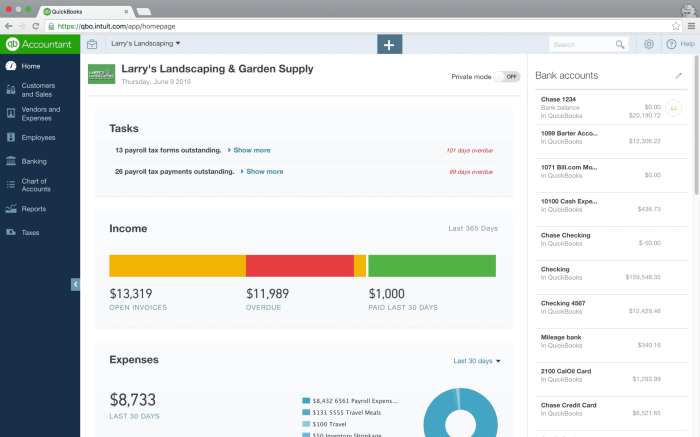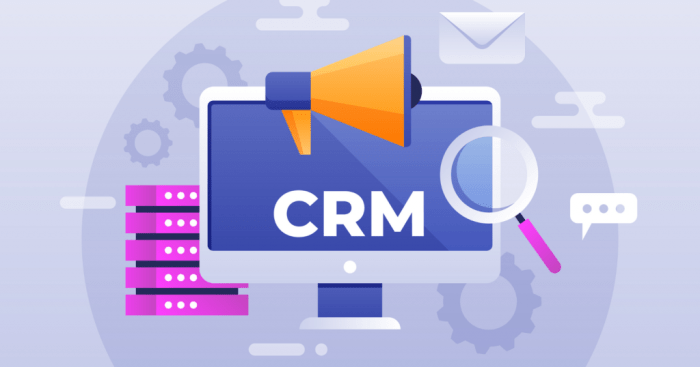Best CRM and accounting software for small business is crucial for streamlined operations and growth. Finding the right tools can significantly impact efficiency, profitability, and overall business success. This exploration delves into the key considerations when selecting integrated solutions, balancing functionality with ease of use and cost-effectiveness for small businesses. We’ll examine features to prioritize and potential pitfalls to avoid in your search.
The market offers a vast array of options, each with its own strengths and weaknesses. Understanding your specific business needs—from client relationship management to financial tracking—is paramount. This guide aims to provide clarity and direction, helping you navigate the complexities and choose the best fit for your unique requirements. We’ll discuss factors such as scalability, integration capabilities, and reporting features to ensure you make an informed decision.
Running a small business is demanding. Juggling sales, customer relationships, and finances can feel overwhelming. The right software can be the difference between struggling to stay afloat and achieving sustainable growth. This comprehensive guide explores the best CRM (Customer Relationship Management) and accounting software options tailored for small businesses, helping you streamline operations and boost profitability. We’ll delve into key features, pricing, and integration capabilities to help you make informed decisions.
Understanding Your Needs: CRM vs. Accounting Software
Before diving into specific software recommendations, it’s crucial to understand the distinct roles of CRM and accounting software. While they often work together seamlessly, they serve different purposes:
CRM Software: Managing Customer Relationships
A Customer Relationship Management (CRM) system helps you manage interactions with current and potential customers. Key features include:
- Contact Management: Storing and organizing customer information (name, email, phone number, purchase history, etc.).
- Lead Management: Tracking potential customers from initial contact to conversion.
- Sales Automation: Automating tasks like email marketing and follow-ups.
- Customer Support: Managing customer inquiries and resolving issues efficiently.
- Reporting and Analytics: Gaining insights into customer behavior and sales performance.
Accounting Software: Managing Finances
Accounting software helps you track your income and expenses, manage invoices, and generate financial reports. Essential features include:
- Invoicing: Creating and sending invoices to clients.
- Expense Tracking: Recording and categorizing business expenses.
- Financial Reporting: Generating profit and loss statements, balance sheets, and cash flow reports.
- Tax Preparation: Assisting with tax preparation and filing.
- Bank Reconciliation: Matching bank statements with your accounting records.
Best CRM Software for Small Businesses
The best CRM for your business depends on your specific needs and budget. Here are some top contenders:
HubSpot CRM, Best crm and accounting software for small business
HubSpot CRM offers a robust, free option with excellent features for small businesses. It’s known for its ease of use and powerful integrations. It’s particularly strong for marketing automation and lead nurturing. https://www.hubspot.com/crm
Zoho CRM
Zoho CRM provides a comprehensive suite of tools at a competitive price. It’s scalable, meaning it can grow with your business. It offers a good balance of features and affordability, making it a popular choice for small businesses. https://www.zoho.com/crm/
Salesforce Sales Cloud (Essentials Edition)
While Salesforce is known for its enterprise-level solutions, its Essentials Edition offers a more affordable entry point for small businesses. It’s a powerful CRM with a wide range of features, but it may have a steeper learning curve than other options. https://www.salesforce.com/solutions/sales-cloud/
Best Accounting Software for Small Businesses
Choosing the right accounting software can significantly simplify your financial management. Here are some leading options:
Xero
Xero is a cloud-based accounting software popular for its user-friendly interface and robust features. It’s ideal for businesses that need a streamlined system for managing invoices, expenses, and financial reports. It offers strong bank reconciliation features and integrates well with other business tools. https://www.xero.com/
QuickBooks Online
QuickBooks Online is a widely used accounting software known for its comprehensive features and ease of use. It offers various plans to suit different business sizes and needs, including options for invoicing, expense tracking, and financial reporting. It integrates well with other software, including payroll services. https://quickbooks.intuit.com/
FreshBooks
FreshBooks is a popular choice for small businesses, particularly freelancers and solopreneurs. It excels at invoicing and expense tracking, offering a simple and intuitive interface. While its accounting features are comprehensive, it may not be as robust as Xero or QuickBooks for larger businesses. https://www.freshbooks.com/
CRM and Accounting Software Integration: The Power of Synergy: Best Crm And Accounting Software For Small Business
The true power of these software solutions lies in their integration. Connecting your CRM and accounting software allows for seamless data flow, eliminating manual data entry and reducing errors. This integration enables:
- Automated Invoicing: Automatically generate invoices from sales data in your CRM.
- Improved Reporting: Gain a holistic view of your business performance by combining CRM and accounting data.
- Better Customer Segmentation: Analyze customer data to create targeted marketing campaigns.
- Enhanced Sales Forecasting: Predict future revenue based on sales pipeline data and financial trends.
Many CRM and accounting software providers offer native integrations or support third-party integration tools (like Zapier) to connect different platforms.
Choosing the Right Software: Factors to Consider
Selecting the best CRM and accounting software involves considering several factors:
- Business Size and Needs: Choose software that scales with your business growth.
- Budget: Consider both initial costs and ongoing subscription fees.
- Ease of Use: Select user-friendly software that your team can easily adopt.
- Integrations: Ensure the software integrates with other tools you use (e.g., email marketing, payment gateways).
- Customer Support: Look for software with reliable customer support to address any issues promptly.
Frequently Asked Questions (FAQ)
Q: Can I use free CRM and accounting software for my small business?
A: Yes, several free options are available, but they often have limitations in features and scalability. Free versions might be suitable for very small businesses with basic needs, but paid versions often offer more comprehensive features and support.
Finding the best CRM and accounting software for small businesses often involves careful consideration of various features. A robust system might integrate seamlessly with other tools, such as a dedicated crm call center software , to streamline customer interactions and improve operational efficiency. Ultimately, the ideal solution will depend on your specific needs, but focusing on integration capabilities can significantly improve your business’s overall performance and profitability.
Q: How much does CRM and accounting software typically cost?
A: Pricing varies widely depending on the software and the chosen plan. Expect to pay anywhere from a few dollars per month for basic plans to hundreds of dollars per month for more advanced features and multiple users.
Q: What is the best way to integrate my CRM and accounting software?
A: Some software offers native integrations, while others require third-party integration tools like Zapier. Consider the ease of integration and the level of automation it provides when making your choice.
Q: Do I need both CRM and accounting software?
A: While not strictly mandatory, using both CRM and accounting software is highly recommended for most small businesses. The combined power of these systems significantly improves efficiency and provides a more complete picture of your business’s performance.
Conclusion
Choosing the right CRM and accounting software is a crucial step in building a successful small business. By carefully considering your needs, budget, and the integration capabilities of different platforms, you can streamline your operations, improve customer relationships, and achieve greater financial clarity. Take the time to explore the options discussed in this guide and select the software that best fits your business’s unique requirements.
Call to Action
Ready to take your small business to the next level? Start exploring the CRM and accounting software options discussed above and find the perfect fit for your needs. Don’t hesitate to try free trials or request demos to experience the software firsthand before committing to a subscription.
Selecting the best CRM and accounting software is a significant decision for any small business. By carefully considering your specific needs, evaluating key features, and understanding the long-term implications, you can optimize your operations and pave the way for sustainable growth. Remember that the ideal solution will seamlessly integrate into your existing workflow, empowering you to manage your business efficiently and effectively.

Source: productivityland.com
Don’t hesitate to leverage free trials and demos to thoroughly assess different options before committing to a long-term partnership.
FAQ Section
What is the difference between CRM and accounting software?
CRM (Customer Relationship Management) software manages customer interactions and data, while accounting software handles financial transactions, reporting, and bookkeeping.
Are there integrated CRM and accounting software solutions?

Source: smallbusinesshq.co
Yes, many providers offer integrated solutions that combine CRM and accounting functionalities, streamlining workflows and data management.
How much should I expect to pay for this type of software?
Pricing varies widely depending on features, user numbers, and provider. Expect options ranging from affordable monthly subscriptions to more substantial enterprise-level solutions.
What are some key features to look for in this type of software?
Key features include invoicing, expense tracking, reporting dashboards, contact management, sales pipeline tracking, and seamless data integration.
How can I ensure data security with this type of software?
Choose reputable providers with robust security measures, including data encryption and regular security updates. Review their privacy policies and security certifications.
